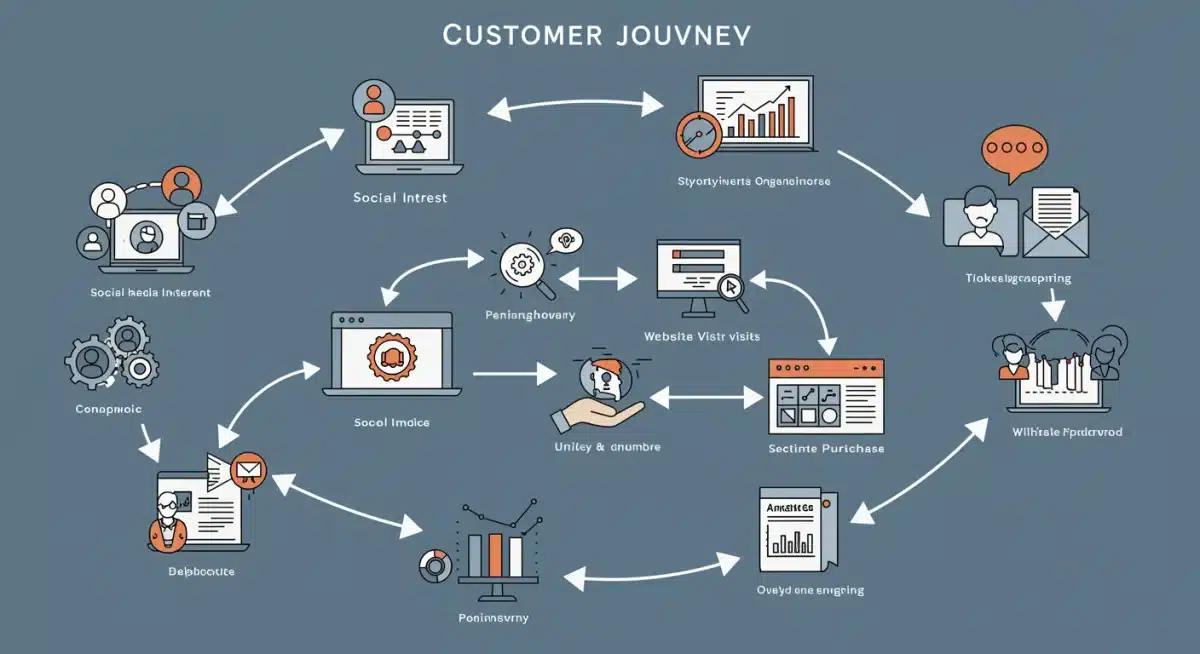Data Analytics for Sports Marketing: Boost Ticket Sales 18% in 2025

Anúncios
Leveraging data analytics for 2025 sports event marketing is crucial for boosting ticket sales, with targeted campaigns poised to deliver an 18% increase by providing practical solutions and significant financial impact.
In the rapidly evolving world of sports, simply hosting an event is no longer enough to guarantee success. To truly thrive and secure a competitive edge, organizations must embrace innovative strategies. This is where sports event data analytics comes into play, offering a powerful pathway to significantly boost ticket sales and enhance fan engagement.
Anúncios
The Power of Data in Modern Sports Marketing
The sports industry, much like any other, is awash with data. From individual player statistics to fan demographics and purchasing behaviors, an immense amount of information is generated daily. Harnessing this data effectively is no longer an option but a necessity for any organization looking to optimize its marketing efforts and achieve tangible results.
Data analytics provides a lens through which marketers can understand their audience with unprecedented clarity. It moves beyond traditional guesswork, offering actionable insights that drive more effective campaigns. For 2025, the integration of advanced analytical tools will be paramount in reaching and converting potential ticket buyers.
Anúncios
Understanding Your Audience Through Demographics and Psychographics
One of the foundational aspects of effective data analytics is the ability to segment your audience. This involves not only demographic data like age, gender, and location but also psychographic data, which delves into attitudes, values, interests, and lifestyles.
- Demographic Segmentation: Identify key groups based on age ranges, income levels, and geographic locations to tailor messaging.
- Psychographic Profiling: Uncover fan motivations, preferred sports content, and media consumption habits to create emotionally resonant campaigns.
- Behavioral Analysis: Track past purchasing behavior, website interactions, and social media engagement to predict future actions.
By combining these data points, sports marketers can develop highly personalized campaigns that speak directly to the desires and needs of different fan segments, leading to higher engagement and conversion rates. This granular understanding allows for the allocation of marketing resources to the most promising avenues.
The strategic application of data analysis transforms raw numbers into a clear narrative about fan preferences and market opportunities. This narrative empowers marketing teams to move beyond broad assumptions, enabling them to craft messages that resonate deeply with specific audience segments. Ultimately, this precision in targeting is a significant driver for increasing ticket sales and building a loyal fan base for sports events.
Predictive Analytics: Anticipating Fan Behavior and Market Demands
Beyond understanding current and past behaviors, the true magic of data analytics lies in its predictive capabilities. Predictive analytics uses historical data and statistical algorithms to identify the likelihood of future outcomes based on patterns and trends. For sports event marketing, this means anticipating which fans are most likely to purchase tickets, when they are most likely to buy, and what kind of offers will appeal to them.
Imagine knowing which demographic group in a specific city is most likely to attend a particular type of sporting event, or understanding the optimal pricing strategy for different seating sections based on demand forecasts. These insights are not hypothetical; they are achievable through sophisticated predictive models that analyze vast datasets.
Forecasting Ticket Sales and Optimizing Pricing
Predictive models can forecast ticket demand with remarkable accuracy, allowing event organizers to adjust pricing dynamically. This dynamic pricing strategy is a game-changer, moving away from static price points to a flexible model that maximizes revenue based on real-time demand.
- Demand Forecasting: Utilize historical sales data, competitor events, economic indicators, and social media sentiment to predict future ticket demand.
- Dynamic Pricing: Implement algorithms that automatically adjust ticket prices based on predicted demand, remaining inventory, and competitor pricing.
- Bundle Offers: Identify opportunities to package tickets with merchandise, hospitality, or other experiences based on predicted fan preferences.
By leveraging predictive analytics, marketers can not only anticipate surges or drops in demand but also proactively adjust their strategies. This agility ensures that events are priced optimally, attracting a wider audience while maximizing potential revenue. The financial impact of such precision is substantial, directly contributing to the projected 18% increase in ticket sales for 2025.
The ability to look into the future, however imperfectly, provides an invaluable advantage. Predictive analytics equips sports event organizers with the foresight to make informed decisions about inventory management, promotional timing, and pricing adjustments. This proactive approach minimizes unsold tickets and ensures that every opportunity to engage with potential attendees is fully utilized.
Personalized Marketing Campaigns: Reaching the Right Fan at the Right Time
In a world saturated with information, generic marketing messages often get lost. Personalized marketing, driven by data analytics, cuts through the noise by delivering relevant content directly to individual fans. This approach increases the likelihood of engagement and conversion, as messages are tailored to specific interests and past behaviors.
Personalization goes beyond simply inserting a fan’s name into an email. It involves understanding their favorite teams, preferred seating locations, past attendance history, and even their browsing patterns on your website. This deep level of understanding allows for the creation of marketing communications that feel genuinely relevant and valuable to the recipient.
Crafting Tailored Messaging Across Channels
Data analytics informs the content, timing, and channel for personalized communications. Whether it’s an email, a social media ad, or a push notification, each message can be optimized for maximum impact.
- Email Marketing: Send targeted newsletters with updates on favorite teams, exclusive pre-sale access, or personalized ticket recommendations.
- Social Media Advertising: Create custom audience segments for platforms like Facebook and Instagram, delivering highly relevant ads based on user interests and behaviors.
- Website Personalization: Display dynamic content on your event website, showing upcoming games or offers based on a visitor’s browsing history or location.
The goal is to create a seamless and highly relevant experience for each potential ticket buyer. By delivering the right message at the right time, sports event organizations can significantly increase their conversion rates and foster a stronger connection with their fan base. This targeted approach is a cornerstone of achieving the ambitious ticket sales growth projected for 2025.

Personalized marketing campaigns are not merely about driving sales; they are about building relationships. By demonstrating an understanding of each fan’s unique preferences, sports organizations can cultivate loyalty and transform casual attendees into avid supporters. This deep connection ensures not only immediate ticket purchases but also long-term engagement and repeat attendance.
Optimizing Marketing Spend Through A/B Testing and Attribution
Marketing budgets are often finite, making efficient allocation critical. Data analytics provides the tools to measure the effectiveness of different marketing channels and campaigns, allowing organizations to optimize their spending for maximum return on investment (ROI). This involves rigorous A/B testing and sophisticated attribution modeling.
A/B testing allows marketers to compare two versions of a marketing asset (e.g., an email subject line, an ad creative, or a landing page) to determine which performs better. Attribution modeling, on the other hand, helps understand which touchpoints in the customer journey contribute to a sale, giving credit where it’s due across various marketing channels.
Measuring Campaign Effectiveness and Allocating Resources
Understanding what works and what doesn’t is fundamental to refining marketing strategies. Data-driven insights ensure that resources are directed towards the most impactful activities.
- A/B Testing: Systematically test different elements of marketing campaigns—from ad copy to call-to-actions—to identify optimal performance.
- Multi-Touch Attribution: Analyze the entire customer journey to understand the influence of each marketing channel (e.g., social media, email, search ads) on ticket sales.
- Budget Optimization: Reallocate marketing spend to channels and campaigns that demonstrate the highest ROI based on data insights.
By continuously testing and measuring, sports marketers can refine their strategies, ensuring that every dollar spent is contributing effectively to ticket sales. This iterative process of optimization is key to achieving significant growth, as it allows for agility and responsiveness to market feedback. The financial benefits of such precise optimization are direct and substantial, supporting the 18% sales boost.
The ability to definitively link marketing efforts to ticket sales empowers organizations to make bolder, more informed decisions. No longer reliant on intuition, marketers can use concrete data to justify budget allocations and demonstrate clear value. This data-driven accountability is essential for sustained growth and efficient resource management.
Enhancing Fan Experience for Repeat Business and Word-of-Mouth
While boosting initial ticket sales is vital, retaining fans and encouraging repeat attendance is equally important for long-term success. Data analytics extends beyond initial acquisition to encompass the entire fan experience, from the moment they consider attending an event to their post-event feedback.
Understanding fan satisfaction, identifying pain points, and personalizing the event experience itself can significantly increase loyalty. Happy fans are not only more likely to return but also become powerful advocates, spreading positive word-of-mouth and attracting new attendees.
Gathering Feedback and Personalizing In-Venue Experiences
Data collection shouldn’t stop once a ticket is purchased. In-venue interactions and post-event feedback provide invaluable data for continuous improvement.
- Post-Event Surveys: Collect feedback on various aspects of the event, from seating comfort to concession quality, to identify areas for improvement.
- In-Venue App Data: Track app usage for food orders, merchandise purchases, or interactive games to understand fan preferences and behavior during the event.
- Personalized Offers: Use past purchase data to offer personalized discounts on future tickets or merchandise to loyal attendees.
By focusing on the entire fan journey and leveraging data to enhance every touchpoint, sports event organizers can create truly memorable experiences. This commitment to fan satisfaction translates into higher retention rates, increased lifetime value, and a strong community of loyal supporters, all contributing to sustained ticket sales growth. The ripple effect of positive fan experiences is a powerful, yet often underestimated, driver of future sales.
A superior fan experience is the ultimate differentiator in a crowded entertainment market. Data analytics provides the framework to systematically identify and address fan needs, transforming a simple event attendance into a cherished memory. This focus on post-purchase satisfaction is critical for fostering loyalty and ensuring that initial ticket sales translate into a continuous cycle of engagement and revenue.
Practical Implementation: Tools and Strategies for 2025
Implementing a robust data analytics strategy requires the right tools and a clear roadmap. For 2025, organizations should focus on integrating advanced analytics platforms, building skilled data teams, and fostering a data-driven culture. The journey begins with data collection and moves through analysis, visualization, and actionable insights.
The landscape of data tools is constantly evolving, offering increasingly sophisticated capabilities. Choosing the right technology stack that aligns with organizational goals and budget is a critical first step. Equally important is the development of internal expertise to effectively utilize these tools.
Key Technologies and Team Development
A successful data analytics strategy relies on a combination of technology and human expertise.
- CRM Systems: Implement robust Customer Relationship Management (CRM) platforms to centralize fan data, tracking interactions and preferences.
- Business Intelligence (BI) Tools: Utilize BI software like Tableau or Power BI to visualize data, create dashboards, and extract actionable insights.
- AI/Machine Learning Platforms: Explore AI-driven tools for advanced predictive modeling, natural language processing for sentiment analysis, and automated campaign optimization.
- Data Scientists & Analysts: Invest in hiring or training a team with expertise in data science, statistical analysis, and machine learning to interpret complex datasets.
The integration of these tools and the development of a skilled team will empower sports organizations to fully leverage the potential of data analytics. By 2025, those who have successfully adopted these practical solutions will be best positioned to achieve significant gains in ticket sales and overall market share. The financial impact of a well-executed data strategy is undeniable, making it a strategic imperative for the future.
The transition to a data-driven marketing approach is a continuous journey, not a one-time project. It requires ongoing investment in technology, talent, and a commitment to continuous learning. By embracing these practical implementation strategies, sports event organizers can unlock unprecedented growth and solidify their position in a competitive market.
| Key Strategy | Brief Description |
|---|---|
| Audience Understanding | Analyze demographics and psychographics for targeted messaging. |
| Predictive Analytics | Forecast ticket demand and optimize pricing dynamically. |
| Personalized Campaigns | Deliver tailored content to individual fans across various channels. |
| ROI Optimization | Use A/B testing and attribution to maximize marketing spend efficiency. |
Frequently Asked Questions About Sports Event Data Analytics
Sports event data analytics involves collecting, processing, and interpreting large datasets related to sports events and fan behavior. This includes sales figures, demographic information, social media engagement, and website traffic to identify patterns and generate actionable insights for marketing and operational improvements.
By providing a deeper understanding of fan preferences and behaviors, data analytics enables highly targeted marketing campaigns, optimized pricing strategies, and personalized fan experiences. This precision leads to higher conversion rates, increased demand, and ultimately, a significant boost in ticket sales.
Marketers should collect a variety of data, including demographic and psychographic information, past purchase history, website and app usage data, social media interactions, and feedback from surveys. This comprehensive approach ensures a holistic view of the fan journey and preferences.
Yes, dynamic pricing is becoming increasingly essential. It allows event organizers to adjust ticket prices in real-time based on demand forecasts, competitor pricing, and inventory levels. This strategy maximizes revenue potential and ensures optimal attendance by being responsive to market conditions.
Begin by defining clear objectives, then identify key data sources. Invest in a robust CRM system and business intelligence tools. Build or train a data-savvy team capable of interpreting insights and translating them into actionable marketing strategies. Start with small, measurable projects to demonstrate ROI.
Conclusion
The future of sports event marketing is undeniably data-driven. As we look towards 2025, the organizations that successfully integrate sophisticated data analytics into their strategies will be the ones that achieve remarkable growth in ticket sales and fan engagement. The projected 18% boost in ticket sales through targeted campaigns is not merely an ambitious goal but a tangible outcome for those who embrace the practical solutions and understand the profound financial impact of a data-first approach. By understanding their audience, predicting behavior, personalizing outreach, optimizing spend, and enhancing the overall fan experience, sports marketers can unlock unprecedented success and cultivate a loyal, thriving fan base. The time to invest in sports event data analytics is now, setting the stage for a more intelligent, efficient, and profitable future.





